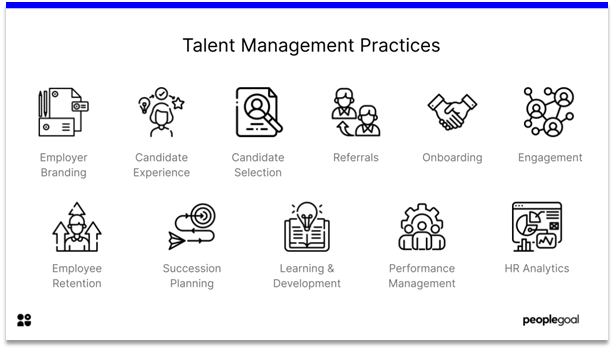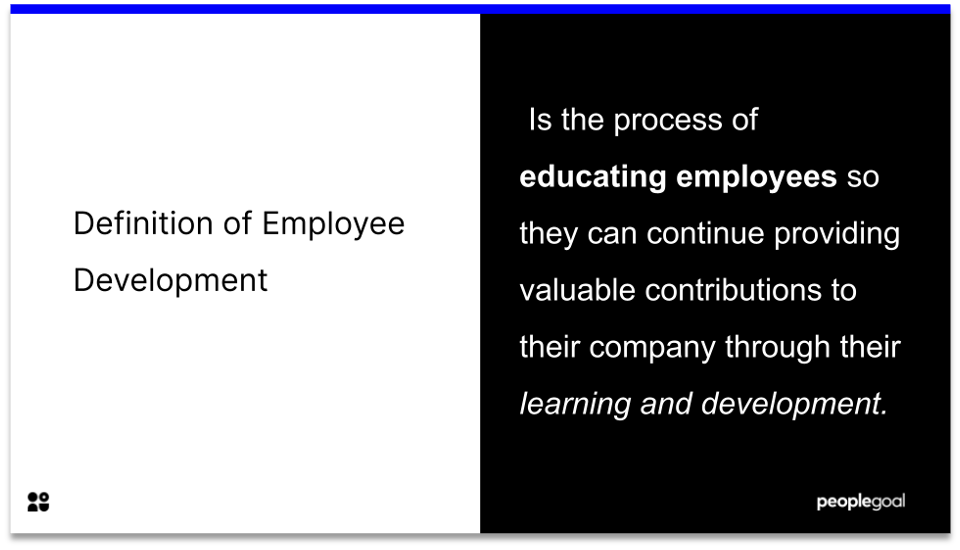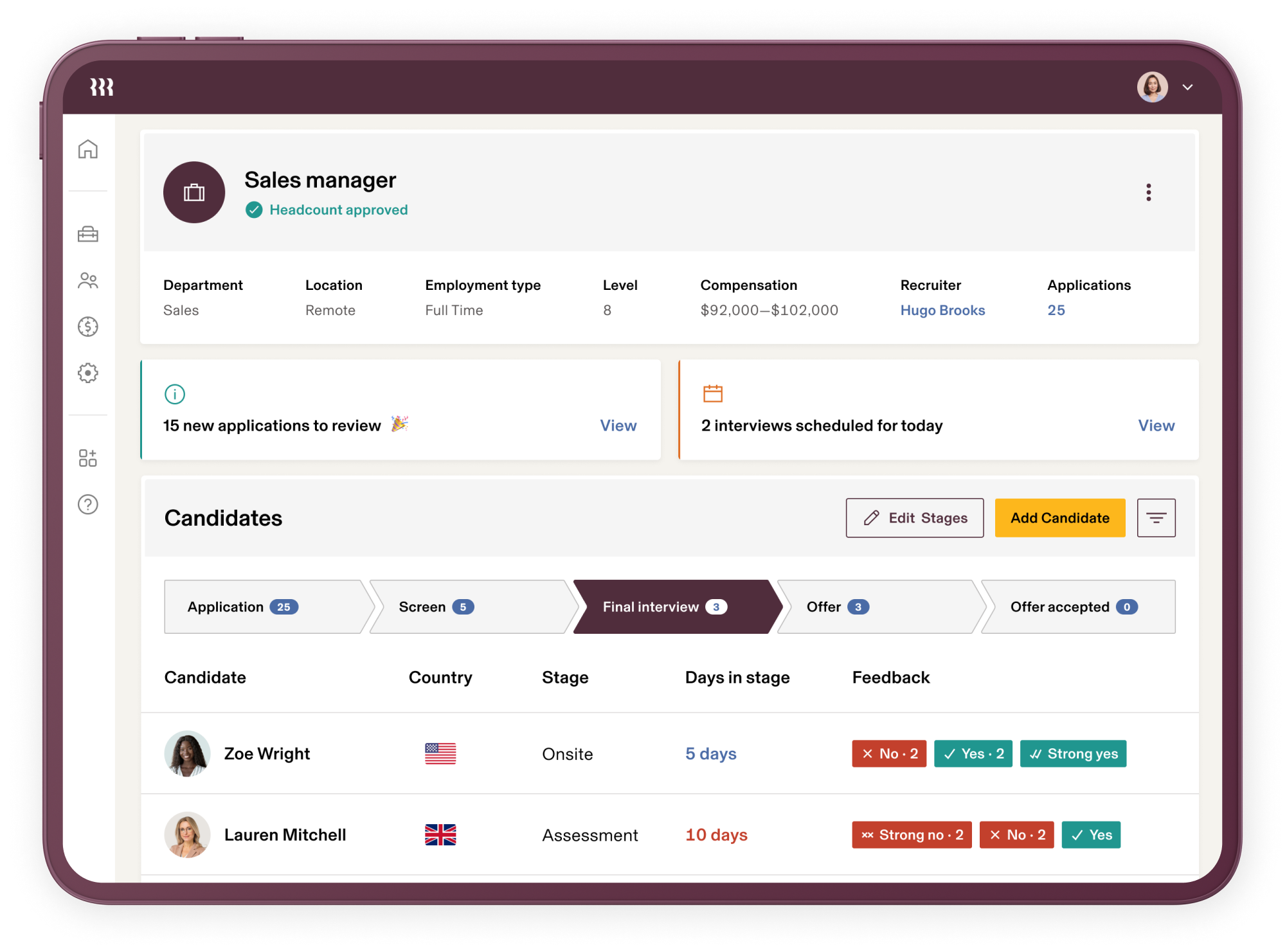Companies are being extremely focused on hiring and retaining great talent, but it takes more to drive high performance. Another key requirement is talent management and development. The leaders who align their company strategy with their talent management and development strategy are most likely to win the war against their competitors and achieve growth.
Quoting Sir Ken Robinson:
“Human resources are like natural resources; they’re often buried deep. You have to go looking for them, they’re not just lying around on the surface. You have to create the circumstances where they show themselves.”
According to the Digital HR Tech, Talent management is the full scope of HR processes to attract, develop, motivate and retain high-performing employees.
Talent Management Practices
There is a variety of practices to focus on.

1. Employer Branding and Reputation
The term stands for the company’s reputation perception from the perspective of a protentional employee promoting the company culture and values it lives by.
2. Candidate Experience
It is the experience of a job seeker based on the interactions with the potential employer during the recruitment process. The stages include the job search itself, the application process, interview process and onboarding once the role is offered
3. Candidate Selection Process
The selection process consists of shortlisting the candidates and their assessment. It is essential for the employers to develop a process that treats the candidates fairly, does not promote discrimination or biases, prioritising the candidates’ abilities, fit with the company and the potential for development.
4. Referrals
It is likely that best talent knows more best talent that would fit your company culture equally well as they do. Therefore, it is worth to invest time and resources into developing an effective process that will encourage your current employees to refer suitable candidates from their network.
5. Onboarding
It is a key aspect of engaging your employees. It can have a significant impact on the employee retention of your workforce. Invest into a tool to help you set an onboarding process or utilize employee journey mapping to identify key moments in your employees’ journeys.
6. Engagement
Employee Engagement can be seen as a result of potent talent management and development. It is traditionally defined as the emotional commitment the employee has to the organization and its goals. We also propose it can be defined by the levels of integration of your employees’ jobs and their lives.
7. Employee Retention
Retention continues to be one of the main challenges for employers in the current everchanging and dynamic society.
8. Succession planning
Focus on identifying and growing talent to fill in leadership positions and ensure success of the companies in the future. Use a talent matrix to assess employees potential.
9. Learning and Development
Opportunities for learning and development are not only essential for the performance of your company and its growth but also for your employee retention.
10. Performance Management
It is a key to improvement of organizational performance and boost employee productivity. It helps organizations to ensure the teams are on the same page and every individual’s efforts are aligned with the wider organizational efforts of the business.
11. HR Analytics
HR analytics can contribute to talent management as it helps organizations to identify the future best talent and focus on strengths and weaknesses of each individual to help them reach their full potential.
It is true it takes a lot of time and effort to implement effective talent management and development practices. But what are the strategies to create a high performing company using your talent?
Top Talent Management Strategies:

1. Aligning employee goals to company vision and strategy.
Every company should follow a top-down approach to communicate the strategy to the teams. Every manager should be able to access the objectives of other teams to allow for cross-team collaboration as well as faster goal completion. Goal alignment will enhance talent management and improve performance. Your employees should be aware of the company strategy and its wider organizational goals. Furthermore, they should be encouraged to align their personal goals to the OKRs and continually review and adjust them.
2. Create internal talent pools
In many occasions companies where unable to pivot due to lack of a talent pool with a specific skillset. A company should not rely on external talent pools, but it should focus in building a strong internal talent pool. The creation of an internal talent pool will allow for specific skill-set development and easier to plan talent succession.
Also, a company will be able to fill leadership roles internally rather than hiring externally someone which might not have the required skillset. A great company example that has strong internal talent pools is General Electric. Internal talent pools are part of GE’s culture for the past 50 years.
3. Promote a collaborative environment.
Needless to say, how important cross-departmental and cross-culture collaboration is in the work environment. Through an effective collaborative environment, a company can manage their talent better and employees develop their talents further as they can collaborate not only horizontally but also vertically within an organization.
4. Implement a social talent management and development system
A smart and social talent management system will help the company align its strategy with employee objectives and also help identify talented individuals that can help build a strong internal talent pool.
5. Reward talent development
Employee motivation goes hand in hand with employee rewards. If a company starts rewarding for talent development, then all employees will put extra effort to develop their skillset.
Ready to 3x Your Teams' Performance?
Use the best performance management software to align goals, track progress, and boost employee engagement.






